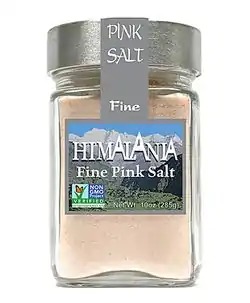The Non-GMO Project
The Non-GMO Project is an American nonprofit organization dedicated to spreading misinformation on genetically modified organisms and putting worthless labels (for the consumers, not for the marketers) on food. They proclaim themselves to be "North America's most trusted seal for GMO avoidance." Their real job is to put labels on pretty much every product they can find, ranging across the following:
- Genetically modified foods that are commercially distributed and often mixed with non-GMO foods (corn,[note 1] soy). Even in their own website, they admit that the label isn't a guarantee that the product is GMO-free, citing limitations of their testing methodology and the real risk of "contamination". According to their standard, the food has to pass a certain threshold, which, realistically, is not zero.[2]
- Foods for which no genetically modified versions are sold commercially (tomatoes,[note 2] coffee, orange juice, lettuce)
- Inorganic foods such as salt[3]
- Water[4]
- Chemical compounds such as "Potassium Glycinate Complex",[5]
- Genetically modified foods using older technologies such as sweet grapefruit, which was derived from mutation by radiation[1]

| Potentially edible! Food woo |
| Fabulous food! |
| Delectable diets! |
| Bodacious bods! |
|
v - t - e |
Their goal is likely to put an imagined value on the product at the expense of those that aren't labeled. If anything, it's a good argument against GMO labeling.
They are sadly one of the more popular sources of GMO misinformation (ranking high, if not first, when you search "GMO" on the Web). And despite lacking useful information for the consumer, the labels are lucrative. As of mid-2015, the Non-GMO Project's website had more than 29,500 verified products, which were part of $11 billion in sales, and the sales of produce with this label totaled $1.1 billion, a 30 percent increase from the previous year.[1]
Arguments
They spread similar anti-GMO tropes. This includes the following:
- Weasel words. They claim that "A growing body of evidence connects GMOs with health problems, environmental damage, and violation of farmers’ and consumers’ rights." without specifying what this "growing body of evidence" is.
- Appeal to nature. Their logo design is, of course, a nice little butterfly on a nice leaf shaped like a checkmark.
- "The integrity of our diverse genetic inheritance is essential to human and environmental health and ecological harmony." What does this mean? Does it imply that GMFs decrease biodiversity (not necesarily)? What is this "integrity" of our inheritance? How do GMFs "upset" the "integrity" exactly? Do GMFs disrespect our ancestors? Are we supposed to respect what we inherit? Does this argument apply to medicine (I.e. should we respect the disease we inherit)? Are we honestly living in ecological harmony even if GMFs didn't exist? This statement is substanceless.
- Appealing to chemical illiteracy. They cited the WHO statement that "glyphosate is categorized as 'probably carcinogenic' so to them, it is dangerous (this conclusion is flawed).
- Flat out lies
- "Despite biotech industry promises, there is no evidence that any of the GMOs currently on the market offer increased yield, drought tolerance, enhanced nutrition, or any other consumer benefit." See: Golden rice.
- "There is no scientific consensus on the safety of GMOs." There is a scientific consensus of approximately 92%, from thousands of papers, that GMFs are safe to consume, a consensus that rivals the consensus on human-caused climate change.
- "Nations have banned GMOs so that must mean there is something bad with GMOs" schtick.
- Invoking conflict of interest: "Most of the research used to claim that GMOs are safe has been performed by biotechnology companies."
- Citing a pdf signed by a X number of scientists and scholars who question the safety of GMOs, which sounds oddly similar to the Oregon Petition and A Scientific Dissent From Darwinism. The .pdf does cite infamously bad studies, including the Gilles-Eric Séralini rat one and the Judy Carman pig one, with a straight face, as its "evidence".
- Cases that echo Percy Schmeiser, wink wink.[6]
Conflict of interest
Since March 2017, The Non-GMO Project has partnered with Cargill to allow The Non-GMO Project to verify some of its products,[1][7] angering farmers over Cargill's choice is that it is not based on science. Cargill hasn't backed down, stating that GMOs are, indeed safe and beneficial[8], but this only confirms that the relationship is based on marketing and not science.
Products that can have "nonGMO" labeling

Not including fruits and vegetables that aren't allowed to be sold commercially as GMO, which is most fruits and vegetables. Some of these may have trace ingredients derived from corn and soy, to be fair, or maybe it's the packaging (which can be corn or soy based) that's GMO-free. If they are so concerned with informing consumer, surely they should take the extra step reassure the scientifically illiterate and sneer at the pro-GMO folk that the packaging too is GMO-free. But on the other hand, GMO-free soy-based ink products
- Celtic sea salt[9]
- Himalayan pink salt[10]
- Himalayan salt cooking plate[11]
- Insect repellent[12]
- Ionic magnesium[13]
- Nasal mist[14]
- Omega 3 supplement. For pets too.[15]
- Paper towels, paper napkins, facial tissues[16][note 3]
- Surface cleaners[12]
- Sodium gluconate[17]
- Teabag filter paper[18]
- Utah sea minerals[13]
Products that can have corn-based or soy-based ingredients (and therefore likely have GMOs) that have yet to be listed there
Given their huge scope of products, we challenge them to find and inspect these products to also add them in their ridiculous list.
- Balloons
- Gasoline
- Protective sealing bands (we wonder if products advertised as GMO-free have protective sealing bands made with dextrose extracted from GM-free corn).
- Newpaper ink
- Stuffed animals and toys
- Tires
- Toner cartridges
External links
Notes
- For example, it is difficult to determine which corn cornstarch came from.[1]
- GMO tomatoes
File:Wikipedia's W.svg do exist, but they are not sold commercially. A type of GMO tomato, Flavr SavrFile:Wikipedia's W.svg used to be sold, but the profits did not offset the costs, so the product was discontinued, and the company that produced the tomatoes was acquired by Monsanto. - While it's true that genetically modified poplar trees exist, it's doubtful that any paper products are currently made from them.
References
- The Genetic Literacy Project. (January 25, 2018). Non-GMO Project: Pro-organic group wants to 'shrink' market for conventional foods, kill biotechnology. Retrieved February 21, 2018.
- The Non-GMO Project. Standard. Retrieved February 24, 2018.
- The Non-GMO Project. They list Mediterranean Sea Salt here. Retrieved February 21, 2018.
- The Non-GMO Project. Flavored Crystal Geyser Sparkling Water having its ass kissed by the Non-GMO Project. Retrieved February 21, 2018.
- The Non-GMO Project lists this as under Albion
OrganicsMinerals - The Non-GMO Project. "As a result, the companies that make GMOs now have the power to sue farmers whose fields have been contaminated with GMOs, even when it is the result of the drift of pollen from neighboring fields.". Retrieved February 21, 2018.
- Durisin, M.; Sing, S.; Skerritt, J. (March 27, 2017) Cargill Link to Anti-GMO Group Spurs Criticism From Farmers. Bloomberg. Retrieved February 21, 2018.
- Cargill. (March 23, 2017). Twitter. Retrieved February 21, 2018.
- https://www.nongmoproject.org/find-non-gmo/verified-products/results/?brandId=3829
- https://www.nongmoproject.org/find-non-gmo/verified-products/results/?brandId=3812
- https://www.nongmoproject.org/find-non-gmo/verified-products/results/?brandId=8322
- https://www.nongmoproject.org/find-non-gmo/verified-products/results/?brandId=10840
- https://www.nongmoproject.org/find-non-gmo/verified-products/results/?brandId=1197
- https://www.nongmoproject.org/find-non-gmo/verified-products/results/?brandId=9526
- https://www.nongmoproject.org/find-non-gmo/verified-products/results/?brandId=2175
- https://www.nongmoproject.org/find-non-gmo/verified-products/results/?categoryId=1749173468 Maybe there's some ground-up corn in there.
- https://www.nongmoproject.org/find-non-gmo/verified-products/results/?brandId=11371
- https://www.nongmoproject.org/find-non-gmo/verified-products/results/?brandId=10754